 July 2, 2012
July 2, 2012
Perhaps the prosecution’s most influential expert witness during the 1992 trial of Bob Kelly was psychologist Mark Everson, director of the Program on Childhood Trauma and Maltreatment in UNC Chapel Hill’s department of psychiatry.
Here’s how Everson responded to a defense expert’s testimony that children are suggestible and should not be repeatedly interviewed: “It’s kind of naïve. It’s the kind of statement you really wouldn’t make if you worked with these kids.”
In a Charlotte Observer interview 10 years later, Everson seemed unmoved by the continuing wave of scientific research exposing the fallacy of “Children don’t lie.” He said he found it hard to believe that every Little Rascals child-witness had been badly interviewed and confused: “There’s so much smoke there, it’s hard to imagine there’s no fire.”
Where there’s smoke there’s fire?
Good lord. I wasn’t surprised to hear such naivete from a juror – “Something must have happened,” one told Ofra Bikel — but from a respected UNC faculty member whose opinion influenced whether Bob Kelly would be convicted and imprisoned?
Last week I emailed two questions to Everson at his Chapel Hill office:
– Have you changed your mind?
– How much credence do you give researchers such as Ceci and Bruck who have demonstrated the unreliability of child-witnesses?
I’ve yet to hear back.
But it’s hard to optimistic about a possible reassessment when Everson continues to choose Kathleen Coulborn Faller as his most frequent coauthor.
